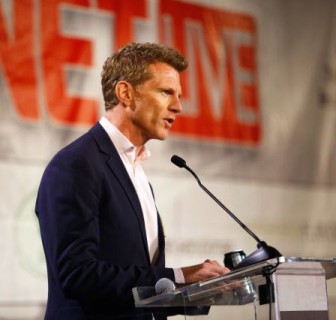
The company had used caramel color in its Colas, Ginger Root Beer, Ginger Ale, Dr. Zevia and Cream Soda, along with natural colors in its Mountain Zevia and Grapefruit Citrus varieties. Zevia’s soda lineup will now entirely be color-free, and the newly formulated products will be available this summer. The 12 oz. cans will feature a “No Caramel Color” band around the top and the Non-GMO Project Verified logo.
Zevia’s distribution footprint encompasses 20,000 retail locations in the U.S. and Canada, and while the privately held company does not disclose financial numbers, Spence told BevNET that Zevia is projecting sales “well north of 100 million cans this year.”
In an interview with BevNET, Spence discussed Zevia’s reasoning and decision to change its formulation and become a non-GMO brand. We’ve condensed the interview into a question and answer format.
BevNET: What were the parameters of Zevia’s research?
Paddy Spence: Initially, we did a [company funded] Harris poll of about 4,000 consumers, which a little over 2,000 are diet soda drinkers. We then replicated that research for our own with 1,600 Zevia drinkers. And the results were very consistent. It wasn’t about just one ingredient, it was a range of ingredients. We’re still focused on continuing to identify the ingredients that people don’t like about soda, and we’re stripping that product down to its essentials: flavors, sweetness, bubbles, and enjoyment.
BN: What did your findings tell the company about how consumers perceive GMO ingredients?
PS: Our brand is and always has been about providing the key ingredient alternative to conventional diet soda. So artificial sweeteners were the focal point of our brand initially, but what we found through our research is that there are a whole bunch of ingredients that shoppers just don’t like in soda. Certainly, artificial sweeteners, artificial colors, artificial flavors, and I think the research we did on non-GMO was really eye-opening.
A greater portion of conventional diet soda drinkers are negative to GMOs even [more] than artificial sweeteners. And hand-in-hand with GMOs goes caramel color; it’s one of many corn-derived ingredients in conventional soda both in full-calorie and on the diet side. Corn is one of the most prevalent GMO crops in agriculture, and consumers were saying “hey, we don’t corn products with GMOs and, frankly, we just don’t like caramel color either.”
For us, our brand is all about listening to our consumer and creating the best possible product that they want. It was a no-brainer to take those ingredients out.

BN: What, if any, influence did Whole Foods have on Zevia’s decision to go non-GMO?
PS: Whole Foods is one of those retailers that has really taken a stand on non-GMO, but there’s not a retailer in the country that isn’t listening to their shoppers. And shoppers are strongly voting with their purchases, and they want non-GMO products. So, Whole Foods is certainly a leader in that regard. Other national industry participants, whether it’s co-ops or natural foods [grocers] largely responsible for the non-GMO labeling, they’ve all been very supportive.
But you’d be surprised. A lot of conventional retailers are now jumping in with both feet. Target has a range of items that are Non-GMO Project Verified on the private label side.
BN: Is natural still the dominant retail channel for sales of Zevia products?
I think our brand definitely skews to the natural channel, and it’s because those retailers have found that Zevia really differentiates their category. It allows them to provide something that conventional soda just doesn’t offer, so that’s certainly been an important channel for us.
BN: How do you view the reformulation of Zevia within the context of an evolving landscape for food and beverages?
PS: We’re seeing consumer products change before our very eyes. You’re seeing it in announcements from Heineken [which is] taking caramel color out of Newcastle Brown Ale, from Nestle taking it out of chocolate products, from Chipotle going non-GMO to Panera [Bread] removing artificial ingredients.
And yet, in soda there’s virtually no innovation in that regard. The biggest change we’ve seen in the last year is Diet Pepsi swapping out aspartame for sucralose. So I think we’re really in the forefront of changing the conversation around soda, and, frankly, changing the perception of soda by American consumers.